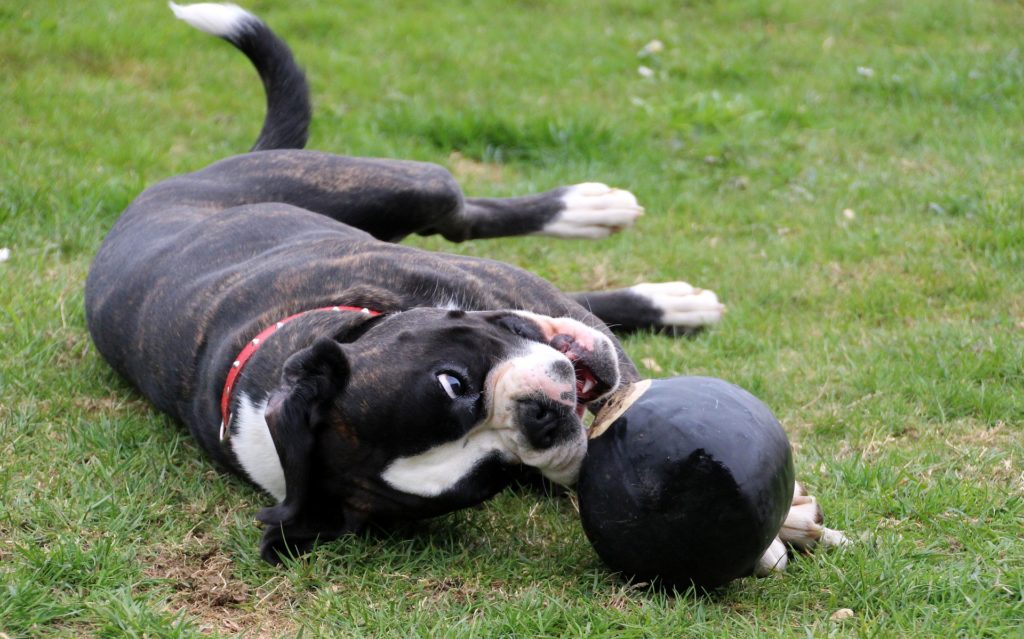It is completely normal to be concerned about your pet’s health. No matter the breed, size, or age, all dogs are prone to some type of health issues at all stages of their life. Although no pet owner wants to hear that their furry friend is sick, you have to be realistic and be prepared for any condition to arise.
If you have a Boxer, the best thing you can do for their health is to educate yourself on potential conditions. With a little knowledge and research, you will be able to spot early signs of larger issues, which could potentially save your companion’s life.
This article will cover all Boxer Dog health issues as well as the steps you can take as their owner to keep them as healthy as possible. Being an educated owner is the best thing you can do for your beloved four-legged friend. Continue reading to find out everything you need to know about Boxer dog health problems and prevention.

Boxer Dog Health Problems
Because of this breed’s natural athleticism, the Boxer tends to be a fairly healthy dog. However, with that being said, all dogs are at risk for developing health conditions throughout their lifetime.
Some possible health problems that may inflict Boxers include:
Boxer Cardiomyopathy (BCM)
Boxer Cardiomyopathy, also known as BAC, FVA, or ARVC, is a genetic condition that causes the heart to beat with an entropic rhythm. In severe cases, a dog can experience heart failure if gone untreated. Most Boxers that are suffering from Cardiomyopathy begin to show symptoms when they are at least two years of age.
Common symptoms of this health condition include irregular heartbeats, fainting, coughing, rapid breathing, fluid in the abdomen, and sudden death. If your Boxer is showing any of these symptoms, and you think it’s from Cardiomyopathy, take him to the veterinarian as soon as possible.
In order for this genetic disorder to be properly diagnosed, your veterinarian will run a series of tests to rule out any other problems. Make sure to provide your vet with a complete record of your dog’s medical history along with any symptoms he has been exhibiting since the onset. From there, the veterinarian will further their testing with an ultrasound of the heart, blood test, chest x-ray, and any other test that they believe is necessary.
Hip Dysplasia
This genetic disease is caused by an abnormal formation of the hip socket. In most cases, hip dysplasia affects larger dog breeds and can show symptoms as early as a few months.
In a normal hip socket, the joints and bones effortlessly glide together and fit into place without any problem. On the other hand, when a dog is suffering from canine hip dysplasia, the joints grind against each other, leading to a deterioration in the hip socket. This hereditary condition causes pain, lameness, and even arthritis in severe cases.
There are many symptoms associated with hip dysplasia. Some of the most common signs include a decrease in activity, loss of thigh muscle mass, a narrow stance, hip pain, difficulty standing, and a decreased range of motion.

When a vet is diagnosing hip dysplasia in a dog, they will run several tests including a urinalysis, a blood chemical profile, an electrolyte panel, an x-ray, as well as a complete blood count.
Hypothyroidism
Hypothyroidism is a condition that occurs when the body is unable to produce a sufficient amount of thyroid hormones.
When the thyroid is unable to function correctly, the dog will experience a number of different symptoms, some more subtle than others. Common effects of hypothyroidism in dogs include lethargy, weakness, inactivity, hair loss, or weight gain.
If your dog is suffering from any of these symptoms listed above, take him to your veterinarian for a thorough examination. A blood count, a biochemistry profile, and a urinalysis will all be performed to diagnose the issue.
Luckily for these dogs (and their owners), hypothyroidism can be easily treated by taking a synthetic hormone medication. Dosages of the drug may vary depending on the dog’s health condition.
Arthritis
Just like with humans, Boxers can also develop arthritis. This condition occurs when joints throughout the body become deteriorated. Although many believe arthritis only occurs in old age, arthritis in dogs can become apparent when they are just a few months old. As arthritis develops in the body, the joints become inflamed causing pain and crippling effects in your dog.
Dogs that suffer from arthritis may show a number of different symptoms including a decrease in activity, stiffness or limping, reluctance to jump or play, partial or complete lameness, aggressive behavior, or whimpering in pain. The symptoms a dog may experience will vary depending on the severity of their arthritis.
Although arthritis is not curable, there are a number of different medications and treatment methods that can slow down the deterioration process. When it comes to treating arthritis, the main focus should be to manage your dog’s pain. Your veterinarian will also get your dog on a weight management plan to reduce excess stress on his skeletal system.
Bloat
GDV, or Gastric Dilation-Volvulus in dogs, is a life-threatening condition that can affect the Boxer breed. Bloat occurs when a dog’s stomach fills with gas, fluid, or air, expands, and then places extra pressure on nearby organs. Once this happens, bloat can cause a tear in the stomach lining, difficulty breathing, or a lack of blood flow to the heart or stomach.
In severe cases of canine bloat, the stomach will actually twist, resulting in GDV. Once the stomach turns, the animal is unable to expel the excess gas, fluid, or air, which causes a drop in blood pressure and restricts blood flow to the heart. If the dog is not treated right away, they are at a high risk of going into shock.
Common symptoms of bloat may include restlessness, retching without vomiting, drooling, anxious behavior, shortness of breath, or lethargy. If your dog is experiencing any of these symptoms after a big meal or a hard workout, take him to the vet as soon as possible. This is a life-threatening situation that can be the difference between life and death.
Ear Infections
If your four-legged companion is suffering from itchy or irritated ears, there is a high chance he may have an ear infection. Most ear problems come from a bacteria or yeast infection which will then lead to a plethora of symptoms if left untreated.
Common causes of ear infections in dogs are allergies, hypothyroidism, Malassezia, trauma, ear mites, foreign object lodged inside the ear, polyps, or Aspergillus. Once your dog becomes infected with an ear infection, he may show symptoms like abnormal discharge and odor from the ear, head tilting or shaking, scabs around the outer ear, or unusual eye movements.
If you believe your dog is suffering from an ear infection, take him to the veterinarian for a thorough evaluation. Once an infection has been diagnosed, your vet can create a strategic treatment plan based on the underlying cause.

To prevent an ear infection from occurring in the first place, ask your vet how to clean your dog’s ears on a regular basis. With a veterinarian-approved solution and cotton ball, you can clean in and around the ear to rid any debris or bacteria.
Seizures
No pet owner ever wants to see their pup suffering from a seizure. As sad as it is, canine seizures affect many dog breeds, including the Boxer. Dogs can suffer from several types of seizures including the grand mal, focal, psychomotor, or idiopathic epilepsy.
If your dog is suffering from this condition, do not try to interfere in any way. The best thing you can do is remove any sharp objects or furniture that may be around while he is seizing.
As the seizure is occurring, take note of the symptoms before and after while also timing how long the episode lasts. Once your dog is in stable condition, take him to your veterinarian for further examination.
Although there is no cure for seizures, there are many different treatment plans that can reduce the frequency of episodes as well as his symptoms. If your dog is suffering from seizures due to a specific trigger, make sure to find the source and eliminate it from his environment.
How to Keep your Boxer Healthy
Although it’s impossible to prevent all Boxer dog health issues, there are still preventative measures you can take to keep them as healthy as possible. Just like in humans, it is imperative that your dog is eating a healthy diet, he is exercised on a regular basis, and he has an annual check-up with his veterinarian.
Healthy Diet
What you feed your dog can have a significant impact on his body as he ages. That’s why it’s important to feed your dog a wholesome, balanced diet from the very beginning. Professionals recommend using a product that contains all-natural ingredients free of any preservatives, animal by-products, fillers or any other harmful ingredient.
In order to provide your Boxer with the best diet possible, consult with your veterinarian for further recommendations.
Daily Exercise
The Boxer is an athletic and energetic breed, which means they will need a sufficient amount of dog exercise to keep them at their best. Generally speaking, a Boxer should have at least 30 minutes to an hour of physical activity a day. If they do not get their required amount of exercise, you can expect them to develop unfavorable behavioral issues.
Not only are daily walks a critical component to their health, but it is also a source of mental stimulation as well. This is especially important for active dog breeds like the Boxer, who require a little extra attention when it comes to daily activities.
Annual Check-ups
Whether your dog is showing any symptoms of illness or not, it is imperative that he is taken in for his annual check-ups with his veterinarian. Prevention is key when it comes to your dog’s health, and most times it can be difficult to see the early signs of an illness before it gets worse.

Taking your dog for his annual check-ups will allow you to spot any disease or condition from the very beginning.
If in the unfortunate event he has been diagnosed with a serious condition, your vet can prescribe a treatment plan before the illness escalates.
So, should you still get a Boxer? The answer to this should be absolutely yes. Just because a Boxer can experience several health problems doesn’t mean they will love you any less.
All dogs are prone to some type of health problems, so it’s an unavoidable factor if you are looking to add a pup to the family.
The best thing you can do as their owner is to be informed of potential issues and take action as soon as any changes arise. As long as you feed your Boxer a nutritious diet, give him plenty of exercise, and take him in for his annual check-ups, you will be doing everything in your power to give your companion a long and happy life.




